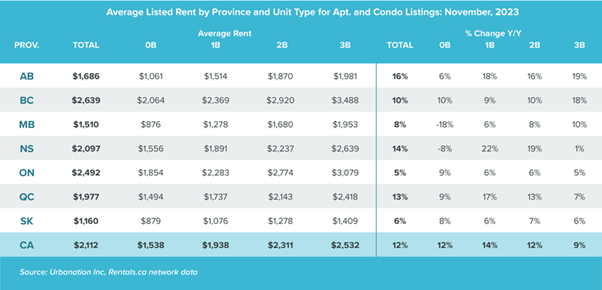Several provinces benefited from strong population growth and new rental supply

An early influx of purpose-built units in various markets led to a noticeable increase in Canada's average rents in October, according to a new report by Rentals.ca and Urbanation.
This was especially apparent in Alberta, Quebec, and Nova Scotia, which all benefited from “a combination of strong population growth and large infusions of new rental supply priced at above-average market rents,” the report said.
Data from the Canada Mortgage and Housing Corporation showed that a total of 36,292 new rental units were completed in these three provinces over the past year. This combined figure accounted for roughly 55% of rental apartments completed in Canada during that period.

Urbanation said that the annual rate of rent growth in Canada was 9.9% in October, the second fastest annual increase in the last seven months. Average asking rents have increased by 8.8%, or by $175 per month, over the last six months.
“Brand new buildings are increasingly becoming highly amenitized with better finishes, strong locations, better design and better layouts,” said Urbanation president Shaun Hildebrand. “Most of the existing rental stock in Canada was built in the 1960s and 1970s. So it’s not hard to see why newer rental buildings command a higher rent than the overall market average.”
The Canadian federal government plans to allocate approximately $20.8 billion over six years to incentivize the development of housing supply and address affordability challenges.
— Canadian Mortgage Professional Magazine (@CMPmagazine) November 22, 2023
Read more: https://t.co/D9lgDIdqgl#mortgageindustry #housingmarket #housingsupply #affordability
Amid mounting household debt, rental market to see even greater pressure
Data from TransUnion showed that Canadian household debt surged towards a record high of $2.34 trillion in Q2 2023, including $1.73 trillion in mortgage debt and $604 billion in non-mortgage debt.
This surge of indebtedness could force a growing number of Canadians to go for the rental market as a more affordable option, according to John Pasalis, president of Realosophy Realty.
“We’re likely still going to see pressure in the rental market because even though rates may be on hold, there [are] a lot of over-leveraged homeowners who will be forced to sell and enter into the rental market, at least for the short term,” Pasalis told BNN Bloomberg recently.
“While we are seeing more inventory come online and pricing cooling just a bit, I think the pressures in the rental market will persist so long as rates remain high.”



